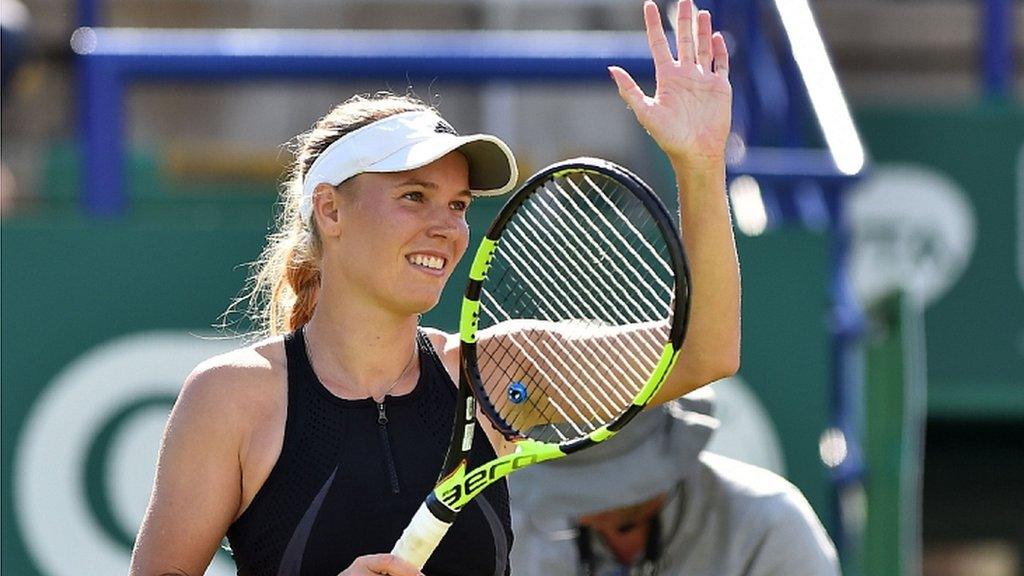Wimbledon 2017: Johanna Konta's journey from quiet child to Grand Slam semi-finalist
- Published
Wimbledon 2017: Johanna Konta beats Simona Halep - highlights
Wimbledon 2017 on the BBC |
|---|
Venue: All England Club. Dates: 3-16 July. Starts: 11:30 BST |
Live: Coverage across BBC TV, BBC Radio and BBC Sport website with further coverage on Red Button, Connected TVs and app. Click for full times. |
Sometimes the journey from nowhere to the heart of it all is a straightforward one. Sometimes you look back and the route and pace all makes sense.
Sometimes it takes you down dead ends and false starts and no one but you really believes you might ever get there.
Two years ago, Johanna Konta, approaching middle age in tennis terms at 24, was so lightly thought of as a championship contender that she required wildcards to play in Nottingham and Birmingham. She had begun that year ranked 150th in the world, and would end her Wimbledon exactly where she had in each of the preceding three years - going out in the first round, the forgotten final paragraph of a report on someone else.
If a big-hitting British woman born in Australia was considered to have a chance of making the Wimbledon semi-finals, it was going to be Laura Robson - girls champion at the All England Club aged 14, Olympic silver medal on Centre Court in the mixed doubles with Andy Murray in 2012, into the fourth round at SW19 a year later.
A long, slow journey with a sudden acceleration. On Thursday afternoon Konta, the first British woman in the world's top 10 for 30 years, becomes the first British woman to step out for a Wimbledon singles semi-final in 39 when she faces Venus Williams on Centre Court. Robson, her own ascent stymied by repeated injuries, went out as a wildcard in the first round to a Brazilian named Beatriz Haddad Maia.
You look for clues to this unexpected late blooming, and there are only the smallest green shoots visible. This is a destination that maybe only Konta and her family really believed might come.

"She was a quiet child," says Lizzie Spencer, who taught the schoolgirl for six years in Sydney. "She wasn't extroverted. There was something in her that was very satisfied in her own company.
"She was very reserved, within herself somewhere. Like water she would flow around whatever it was you were teaching, and then she would give her full concentration to it.
"But she had an emotional maturity. It wasn't lots of questions, it was the occasional pointed question. She knew herself, and that's what evident now - she seems to have a mature way of dealing with her inner life, so it can serve her."
Konta says her character kept her apart from others, and that she struggled to make friends. But under the placid exterior lurked a fierce competitiveness, as Konta's Hungarian emigre father Gabor would discover to his cost.
"I was pretty serious from about nine," Konta said in a 5 Live special.
"I came home and said, 'Dad, I want to be the best in the world.' So I woke him up every morning at 5am to go running.
"That was me. I was very dedicated to working hard. I would do anything I had to do to be better, to be fitter, to be stronger."
Lots of sports-mad kids say they want to be the best in the world. Konta's determination may have been evident but her talent was not. Aged 12, she was ranked as merely the 388th best junior in Australia.
"There were no signs that she was going to be as successful as she has been," says Pete McCraw, Tennis Australia's national women's coach at the time.
"What she did bring was an unrelenting desire to succeed. She was always up for the session. You could see that there was a genuine love of the experience, even if it was a losing one.
"No matter what the situation in a match or score, she had the ability to bring a competitive attitude. As a coach it's very difficult to teach that."
Dead ends and false starts. When Paula Radcliffe ran her first English Schools cross country championships, she finished 299th. When a nine-year-old Alistair Brownlee first entered the Leeds Schools cross country championships, he began in a field of 450 entrants and finished 400th.
Konta, the quiet one, looked around her, saw the gaps and, with the support of Gabor and her mother Gabriella, pushed on regardless. Aged 14 she went to stay at the same Sanchez-Casal academy in Barcelona that had acted as Andy Murray's finishing school, even if it meant being apart from her parents for up to four months at a time.
Home schooled, she moved with her family to east London and then Eastbourne. Still the rewards did not come. For year after morale-sapping year.
"When I heard about Jo four years ago, it was all, 'why are the LTA spending so much money on a player who may not even break the top 100?'" former British number one Sam Smith told BBC Sport.
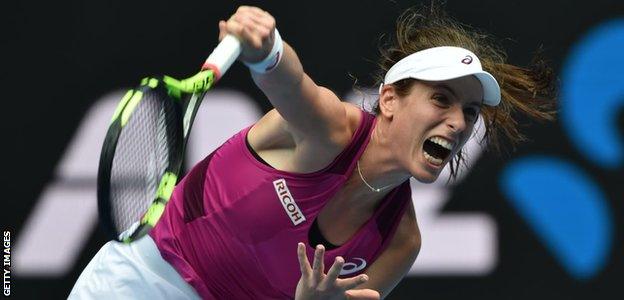
Johanna Konta reached the semi-finals of the Australian Open in 2016, losing to eventual champion Angelique Kerber
"Her potential was not seen. It was maybe only spotted by a couple of coaches. But her belief was absolutely that she was going to the top, and that's what I find extraordinary.
"She was very clear: all she wanted to be was the best tennis player she could have been. And nothing was going to send her off course, even when she was ranked 150 in the world and maybe plateauing and becoming very frustrated with her game.
"People say her rise up the rankings is because of hard work, but the level of effort and daily diligence that she has put in is an exceptional talent in its own right. Because most of us can't do it - we can't keep ploughing on when things aren't going well and the results aren't coming."
Konta is still much like the young girl that Lizzie Spencer taught back in the northern Sydney suburbs. She does not like to give much of her internal life away to the public; when she has, her earnest talk about learning how to roast potatoes and bake chocolate chip muffins can sometimes give the impression of a woman not quite at ease with all that comes with on-court success.
Those who have witnessed her journey might point out that true character is less about being comfortable on camera and more about keeping going when no-one is watching, about coming through even when you keep failing.
Because failing was what she did, for a long time, at least in the cruel parameters of elite sport, particularly when the pressure came on, particularly when it seemed the opportunity was there to move on up.
Conquering that mental fragility with the help of sports psychologist Juan Coto was perhaps the most important junction of all, just as continuing to put his advice into action after his untimely death at the end of last year has taken her from dangerous challenger to serious contender.
If it has left her sometimes talking as if she is dictating a self-help book, it has given her the fortitude to get through matches where before her frustration might cut her down - in her three-hour, 10-minute victory over Donna Vekic in the second round here, in overcoming the 36 unforced errors she made against Simona Halep to battle through the quarter-finals.
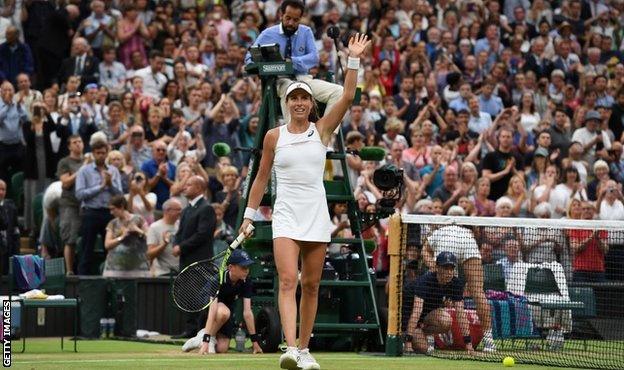
Johanna Konta has beaten second seed Simona Halep and 21st seed Caroline Garcia on her way to the semi-final
"The first time I saw Johanna play in 2015 she was unknown," says her Belgian coach Wim Fissette. "But she showed me this attitude: I am Johanna Konta, I am very confident in my game and myself, and I give myself a big chance to beat you here today. That is what a big champion does."
Fissette, who has also worked with former world number ones Victoria Azarenka and Kim Clijsters, knows too that Konta's game has the hallmarks of a championship winner: a big serve, a big second serve, a relentlessness from the baseline, endurance befitting a former 800 metre track runner.
Thursday afternoon on Centre Court will bring pressure like she has never experienced before. So great once was the gap between her and opponent Venus Williams that the Briton used to buy leggings from the five-time champion's fashion range. She has been texted by both Mick Jagger and U2.
After her long and winding road, she will be ready for it. "I love the competition," she says. "As a kid, that's when I truly fell in love with the sport."
A late arrival, a worthy contender. For an unexpected star, Britain now expects.
- Published12 July 2017
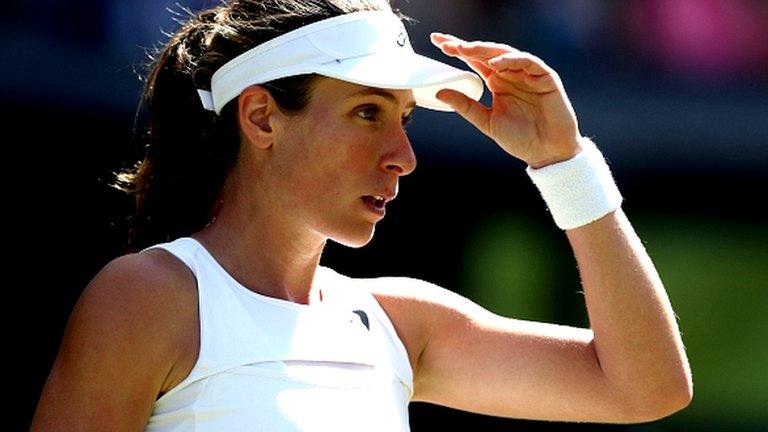
- Published11 July 2017
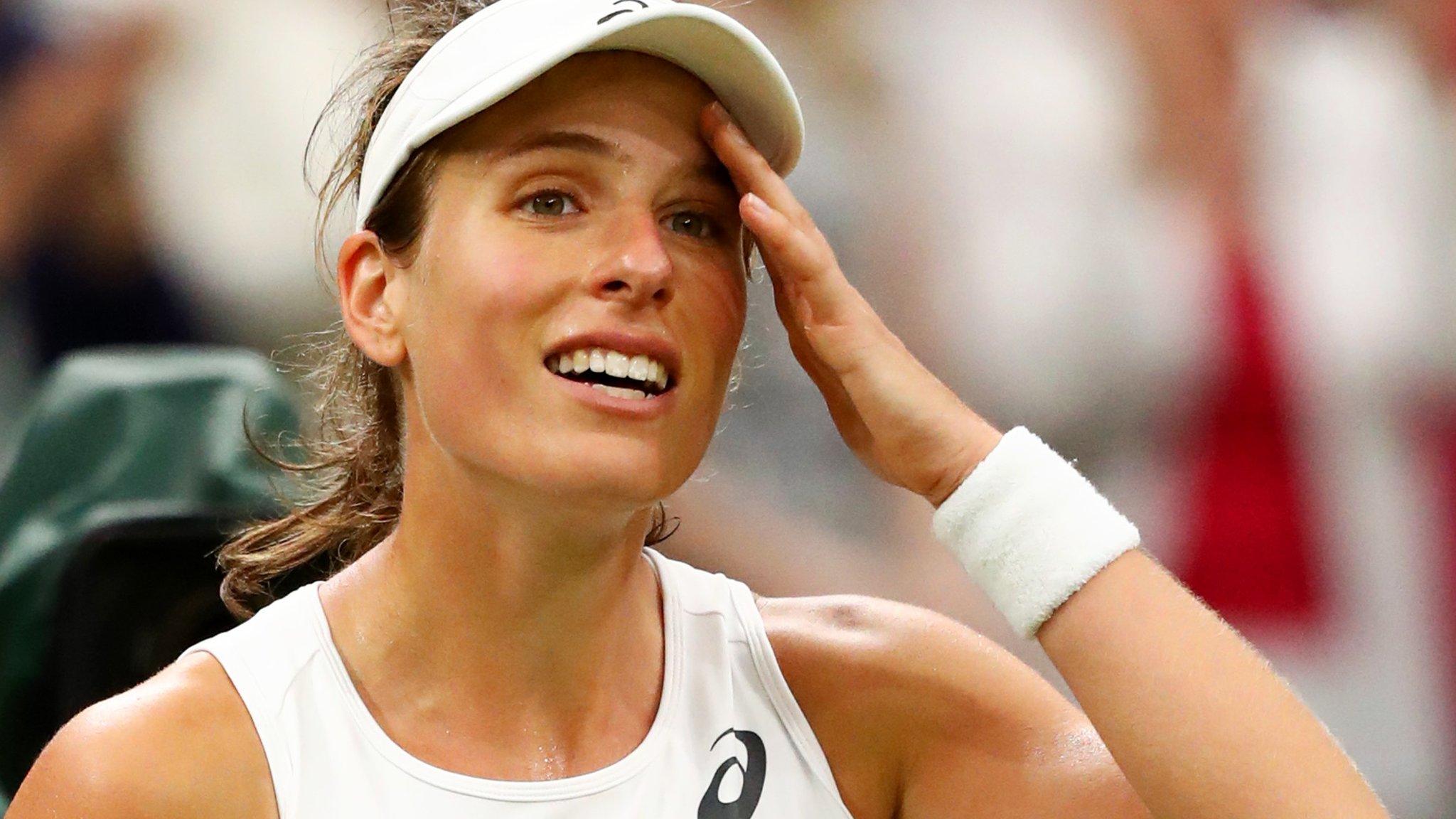
- Published10 July 2017
- Published30 June 2017
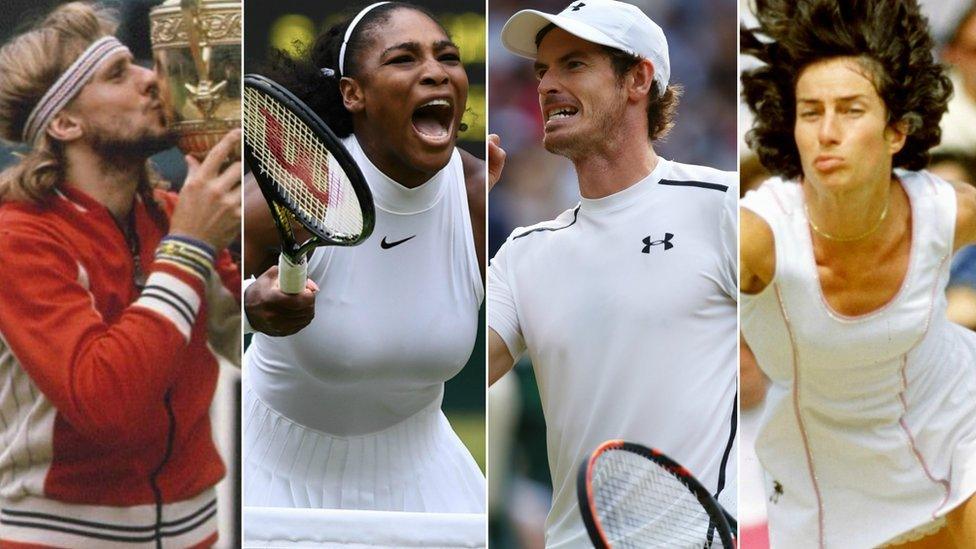
- Published24 June 2018
